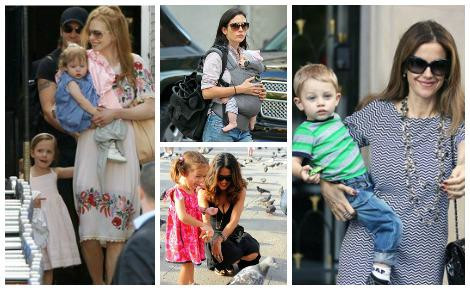The risks - and rewards - when motherhood begins at 40
 January 2008 -- Geena Davis did it. So did Emma Thompson and Susan Sarandon.
January 2008 -- Geena Davis did it. So did Emma Thompson and Susan Sarandon.
Now, Nicole Kidman is joining the swelling ranks of women who have their first baby after the age of 40.
Only a century ago the average life expectancy for women was about 50, so a 35-year-old would have been an ageing matriarch with grandchildren in tow.
But now one in seven babies in Australia is born to a woman older than that as thousands hit the snooze button on parenting.
Maturity can bring a satisfying career, a healthy bank balance and a well-rounded sense of self, but women who become pregnant later in life also have a much greater risk of miscarriages, ectopic pregnancies, and stillbirths.
Older women are also more likely to have induced labour, epidural anaesthesia, forceps or vacuum deliveries, and caesarean sections. They have a one in 100 chance of having a child with chromosomal abnormalities such as Down syndrome.
A fertility specialist with IVF Australia, Michael Chapman, said yesterday that women aged 40 to 45 had a one in four chance of miscarrying.
Age and the miscarriage rate are linked because the older a woman gets, the older her eggs get. They become more fragile with age and have abnormalities, which can lead to miscarriage or disorders such as Down syndrome.
He said pregnant women in their 30s and 40s had a greater risk of hypertension and gestational diabetes, which often required intervention during labour.
One study showed first-time mothers older than 40 were 14 times more likely to have a caesarean than those under 30.
Most obstetricians encourage older women to have a caesarean section because their muscles are weaker and their tissues are less elastic,
Dr Chapman said.
But the secretary of the NSW Midwives Association, Hannah Dahlen, said yesterday, women should not be deterred.
Older mothers are more likely to be educated and financially secure, more settled in themselves and more prepared to make the sacrifices required to be a mother,
she said.
They are better able to negotiate care for their child, their children often do better in school, and it has also been shown in some studies women who have babies in their 40s live longer.
Read more: The risks - and rewards - when motherhood begins at 40
TODAY'S BOOK SUGGESTION:
 It Starts with the Egg:
It Starts with the Egg:How the Science of Egg Quality Can Help You Get Pregnant Naturally, Prevent Miscarriage, and Improve Your Odds in IVF
by Rebecca Fett
-- Whether you are trying to conceive naturally or through IVF, the quality of your eggs will have a powerful impact on how long it takes you to get pregnant and whether you face an increased risk of miscarriage.
Poor egg quality is emerging as the single most important cause of age-related infertility, recurrent miscarriage, and failed IVF cycles. It is also a major contributor to infertility in PCOS.
Based on a comprehensive investigation of a vast array of scientific research, It Starts with the Egg reveals a groundbreaking new approach for improving egg quality and fertility.
With a concrete strategy including minimizing exposure to toxins such as BPA and phthalates, choosing the right vitamins and supplements to safeguard developing eggs, and harnessing nutritional advice shown to boost IVF success rates, this book offers practical solutions to will help you get pregnant faster and deliver a healthy baby.
Click to order/for more info: It Starts with the Egg
Don't have a Kindle? Get your Kindle here, or download a FREE Kindle Reading App.
Category: birth defects, Fertility, Miscarriage, risks, Too Old










0 comments